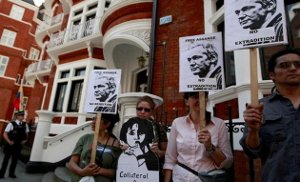2012-07-10 Fear of U.S. backlash further justifies Assange's concerns

Julian Assange arrived at the Ecuadorian Embassy in London on June 19 in order to seek political asylum. His application is based on concern of U.S. extradition and prosecution.
Since the announcement of his decision to seek asylum, there has been discussion of possible U.S. rebuttal if Ecuador were to accept Mr Assange into asylum.
The editorial board of The Washington Post published an opinion piece on June 20, the day after Mr Assange arrived at the Embassy. In the article they suggested possible economic ways the U.S. may harm Ecuador:
There is one potential check on Mr. Correa’s ambitions. The U.S. “empire” he professes to despise happens to grant Ecuador (which uses the dollar as its currency) special trade preferences that allow it to export many goods duty-free. A full third of Ecuadoran foreign sales ($10 billion in 2011) go to the United States, supporting some 400,000 jobs in a country of 14 million people. Those preferences come up for renewal by Congress early next year. If Mr. Correa seeks to appoint himself America’s chief Latin American enemy and Julian Assange’s protector between now and then, it’s not hard to imagine the outcome.
A few days later, Otto Reich—former senior official in the administrations of Presidents Ronald Reagan, George Bush Sr, and George Bush Jr—advocated for the U.S. to act against Ecuador. He labels Mr Assange as a "accused sex-criminal" and falsely states he faces "serious charges", despite him only facing allegations. He also attacks Ecuadorian President Rafael Correa, stating "Americans may not know just how much damage Correa has done to U.S.-Ecuadorian relations and democracy in his country".
In a recent radio interview, the Ecuadorian Ambassador to the U.S., Nathalie Cely, also brought up the idea of potential U.S. backlash against Ecuador, should they grant Mr Assange's request for asylum:
Giving asylum to Assange would be used as ammunition to attack the country.
She further stated that pressure groups had already launched salvos in order to "disparage her country in the eyes of U.S. business leaders and policymakers" and that recriminations against Ecuador for sheltering Assange "already have begun".
While threats of U.S. backlash may attempt to dissuade Ecuador in granting Mr Assange's asylum, it should actually have the opposite affect. If the U.S. is so completely against the idea of Mr Assange receiving asylum that they would economically or otherwise harm a country which accepts him, this further justifies Mr Assange's fears of U.S. prosecution.
Since September of 2010, a secret Grand Jury has been investigating WikiLeaks. Recently, it was revealed that the Grand Jury is targeting seven civillians who are "founders, owners, or managers of WikiLeaks". The FBI file into WikiLeaks now contains 48,135 pages, with one fifth of them relating to alleged WikiLeaks source Pfc. Bradley Manning.
The U.S. Justice Department recently confirmed that their investigation into WikiLeaks is ongoing. Soon after, Chairman of the Senate Select Committee on Intelligence, Californian Democratic Senator Dianne Feinstein, renewed the call for prosecution of Julian Assange:
I believe Mr Assange has knowingly obtained and disseminated classified information which could cause injury to the United States. He has caused serious harm to US national security, and he should be prosecuted accordingly.
Julian Assange has also been labeled a terrorist by the current U.S. Vice President, and also has faced multiple calls for his assassination from U.S. political figures.
It is evident that the U.S. poses a great threat to Julian Assange. Despite all this, some journalists and critics are still perpetuating the skepticism of serious danger.
The Ecuadorian Ambassador to the U.S. stated that her country is "ready as ever to defend our position and our decisions". Hopefully this means standing up to the bully nation the United States has become and accepting Mr Assange into political asylum.